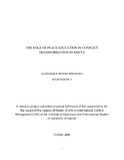| dc.description.abstract | Available literature postulates.
A relationship between peace education and conflict transformation does exist. In many instances, introduction of peace education into schools ‗curriculum is viewed as a long-term goal of conflict transformation. In Kenya, the Ministry of Education as a way to foster peace and transform the warring communities to peaceful livelihood, introduced peace education in 2008 into the school curriculum. This move came after the controversial 2007/08 general election that left behind many deaths and displacements and other serious human rights atrocities, including violations on freedom of movement, assembly and opinion in several places in Kenya. It was envisaged that this move would prosper conflict transformation in the country. However there seems to be little progress in using peace education for conflict transformation in Kenya and available evidence is scant to robustly support the peace education-conflict transformation narrative. It is upon this premise that this study aimed to analyze the critical link between peace education and conflict. Specifically, the study examined the role played by peace education in school‘s curriculum in conflict transformation and investigated the potential pathways through which peace education has impacted peace in Kenyan schools.
The research findings are that peace education is very important and has positive impact to conflict transformation. Peace education creates a picture of the whole by bringing varying aspects of conflict to the immediate situation by comparing the past problems and having the relationship thus giving quick solutions for present and envisioning the same to create a platform to address the content, context and the structure of the relationship.By creating awareness, natural discourse through education, conflict is avoided by looking things or situations at face value instead of deeper interpretation, positive thinking, perceptions and feelings that enhance love, understanding and clarity in human relationships. The approach of building new things generates creative platforms that simultaneously address the surface issues and change the underlying social structures and relationship patterns.
The study was informed by the conflict transformation model by Paul Lederach, who asserts that the potential for conflict transformation is in understanding conflict as evolving from and producing changes in personal, relational, structural and cultural dimensions of human experience. The target for transformation through peace education is therefore revolving around the above four pillars. The research employed a mixed methods approach, combining both critical review of the literature with in-depth interviews with key informants in the education sector. The study was limited to Nairobi County given its one of the counties where peace education curriculum has been implemented in schools.
This study was intended to elaborate on the fact that peace education can directly or indirectly lead to conflict transformation. In a direct way, students in schools gather knowledge on how to live peacefully while indirectly, through peace education there is interaction with other factors like political, economic, cultural and structural to foster conflict transformation. Conflicts in Kenya dates back from the structural imbalances inherited from the colonialists to the present generation. This trend is now seen through ethnic imbalance and unequal representation of ethnic groups on a political level. Among the factors that contribute to conflict transformation will be an investigation into the incidences of school uprisings and strikes, as well as harmonious relationships among students from different ethnic background.
The research aims at contributing and recommending as well as lobbying for the mandatory implementation of its findings to the Ministry of Education in its periodical reviews of the peace education subject that it may suite the learners‘ needs. It is hoped that the study will make a theoretical contribution to the body of knowledge related to conflict prevention and transformation with a particular emphasis on the role played by peace education in ensuring a conflict free society. | en_US |

